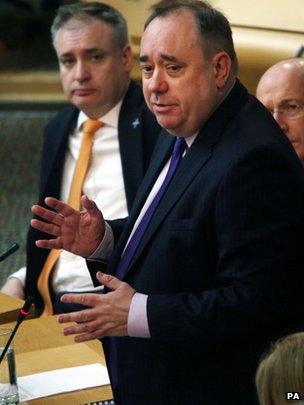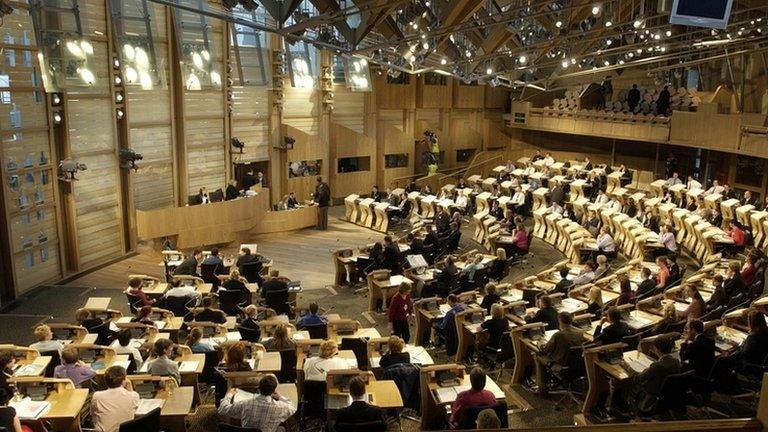The currency of debate at First Minister's Questions
- Published

Had Alex Salmond forgotten his CV, asked Johann Lamont?
In decrying a political rival, one can try a range of tactics. Perhaps it will be best to strike directly, to target a particular policy. Or perhaps one might try subtlety, satire, drollery. Then again there is the strategy of guilt by association.
Examples of that latter tactic were on display at Holyrood today. In pursuing the issue of the currency today, Labour's Johann Lamont noted in passing that her rival, Alex Salmond, used to work for the Royal Bank of Scotland.
Cue mild indignation on SNP benches? What point, what relevance? Protestations of innocence from Ms Lamont - had the FM forgotten his CV?
Of course, what she was doing was associating the First Minister with a fallen Scottish icon, linking him directly with economic failure.
Willie Rennie of the Liberal Democrats went further. Was the First Minister, he asked, turning into the Margaret Thatcher of Scottish politics?
How so? Mr Rennie recalled her speech: "U Turn if you want to, the lady's not for turning." Similarly, he said, the FM was showing stubborn determination to back a post-independence sterling zone when other supporters in Yes Scotland were positing alternatives.
Mr Rennie got his metaphor just a fraction tangled when he went on to ask if the FM intended "wobbling" at any point. Mr Salmond rose magisterially and suggested that he would leave wobbling and flip-flopping to the Lib Dems, plainly regarding them as experts.
For the Conservatives, Ruth Davidson piled in by inviting the First Minister to offer reassurance in the light of potential problems identified by the Institute of Chartered Accountants of Scotland with regard to pensions, post independence.
Again, she misfired very slightly in asking the FM to identify which European nations he had consulted regarding the prospect of removing the EU requirement for full funding of any cross-border pension schemes.
Only a little wearily, Mr Salmond replied that there was no need for a derogation from the EU rule - and that the ICAS report had also set out potential solutions to the problem they identified.
But, still, the overall impression left from this session of questions to the First Minister was of a sustained attack by supporters of the Union against the principal proponent of independence.
The chairman of the campaign to win a yes vote in next year's independence referendum says he would personally prefer an independent Scotland had its own currency.
Some of the ammunition had been supplied in advance by Mr Salmond's colleagues in Yes Scotland.
Ms Lamont, for example, drew attention to Dennis Canavan's BBC interview in which he challenged the concept of a sterling zone.
Alert to the sensitivity of the issue, Mr Salmond and his cohorts declined to step into traps laid by the Labour leader.
Firstly, she deployed the familiar tactic of inviting Nationalist members to put their hands up in support of the First Minister's currency position.
Mr Salmond said, dismissively, that a comparable gag had been used by Ed Miliband - with minimal success. (Me, I remember Michael Foot using it in the Commons in the early 1980s. It worked then.)
Secondly, Ms Lamont deployed an equally familiar strategy. She gave Mr Salmond the chance to rule out a separate Scottish currency. Once again, Mr Salmond refused to follow her lead - preferring instead to stress his preference for a sterling zone.
The big question
In all, the Labour leader was in rather good form, deftly adapting her content instead of relying solely upon prepared material. She drew laughter with a neat sally about Fred Goodwin and banking regulation. (OK, maybe you had to be there.)
And, of course, the First Minister replied with vigour, partly by defending his own approach, partly by drawing attention to what he regarded as inconsistencies among his opponents, partly by pointing out that Labour, the Lib Dems and the Tories were now occupying common ground.
But the session once again pointed up the pressure imbalance generated by the referendum. Supporters of the Union need only point up potential problems, identify pitfalls.
Alex Salmond has to provide complete reassurance, with details and sums. Their brush can be as broad as you care. He has to show his working; all of it.
But, then, that is the nature of a referendum in which a single proposition is being tested, by contrast with an election which subjects competing manifesto packages to scrutiny.
Yes, it will be entirely legitimate and right to challenge Unionists on their thinking for the future of Scotland - but the question under immediate decision remains: "Should Scotland be an independent country?"
- Published2 May 2013

- Published30 April 2013

- Published2 April 2013
